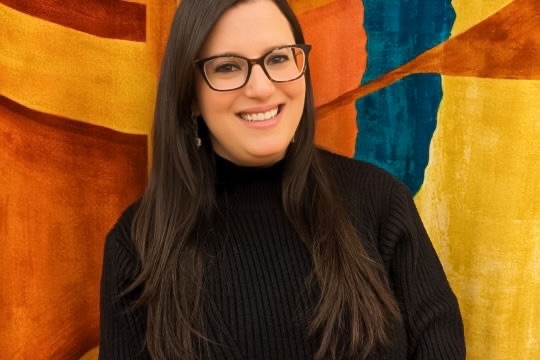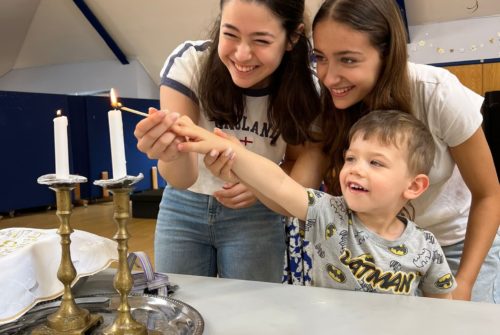When I was a child, my family and I used to vacation to one of my favorite places: Disney World in Florida. One of our go-to rides was called the Twilight Zone Tower of Terror. It involves ascending to the top of a very tall tower in a haunted freight elevator. When it reaches the top, it perches precariously as its passengers grip on to the handlebars for dear life. Suddenly, the elevator plummets 13 floors, and then, after a series of only slightly less terrifying drops, it safely settles back on the ground floor. That loaded, anxiety-filled moment of hovering at the top, of knowing what came before but not knowing exactly what’s coming next, is what gave the ride its name and theme: The Twilight Zone.
Twilight represents a moment of in-between, of transition. We experience twilight as a transition between day and night, and it is often a time of anxiety for us. It brings on the darkness, which we often associate with a heightened sense of fear and danger. Our liturgy affirms the anxiety associated with the setting of the sun: in the evenings we recite one additional prayer after the Shema, the Hashkiveinu, expressing our need for God’s protection as night begins to fall. And when we awaken and recite our morning prayers, our liturgy guides us toward gratitude for having lived through the darkness of night and of sleep in order to witness another sunrise.
Our Sages harbored a different anxiety about twilight. They taught in Talmud Masechet Shabbat 34b that “twilight is a period of halachic uncertainty. It is unclear whether twilight consists of both day and night. There is uncertainty whether it is completely day, or whether it is completely night. Therefore, the laws of both day and night apply to it. If there is a law that applies on either day or night, or from one day into the next day, one is obligated to adhere to it during the twilight period.” Whether they were concerned with laws of ritual purity, liturgical accuracy, or time-keeping, the Rabbis understood that the ambiguity of twilight was cause for concern.
Yet even as twilight may elicit anxiety, our tradition also recognizes that there is a special sense of opportunity within it. We recite in our evening liturgy: Baruch Atah, Adonai, ha’maariv aravim: Blessed are You, God, who brings on the evening twilight. Twilight is a Divine creation and is part of the natural cycle of life and of nature. Our tradition teaches that twilight harbors that same Divine creative energy within it. And if we take a closer look at this week’s Torah portion, we will see one such example of a miraculous twilight creation.
This week’s Torah reading contains the story of Balak and Balaam, and their plan to defeat the Israelites. Balak was threatened by the Israelites, so he hired Balaam to help curse and defeat them.
Balaam heads toward the Israelite camp, but along the way his donkey swerves from the path three times. She is trying to protect Balaam from a sword-wielding angel of God that only she can see. Each time the donkey stops, Balaam beats her in frustration. Finally, the donkey says: “What have I done to you that you have beaten me these three times?” (Numbers 22:28). Apparently unphased by the fact that his donkey can now speak, Balaam retorts, “You’re mocking me! If I had a sword with me, I’d kill you!” (22:29). The donkey then talks back, saying, “‘Look, I am the donkey that you have been riding all along until this day! Have I ever done this to you before?’ And Balaam admitted, ‘No, you haven’t’” (22:30).
God then enables Balaam to finally see the threatening angel before him. When he realizes that he is in the presence of God, Balaam falls to his knees and says, “I erred because I did not know that You were standing in my way” (22:34). God tells him to continue on his path, but that he is only allowed to speak the words that God instructs him when he arrives. To Balak’s dismay, Balaam ends up not cursing but blessing the Israelites. One of these blessings should sound familiar from the beginning of our service this morning: mah tovu ohalecha Ya’akov, mishkenotecha Yisrael: how good are your tents, Jacob, and how pleasant are your dwelling places.
The talking donkey in this Torah portion is not just a convenient plot device to move the story along. Our Sages teach that the donkey’s speech is a miraculous creation which both literally and figuratively changed the course of history – a miracle which was created at a very special time: the first twilight before the first Shabbat.
Those who were in Rabbi Mark’s shiur will already know that Pirkei Avot 5:6 tells of ten things that were created at twilight on the eve of the very first Sabbath, and one of these is the mouth of the donkey that spoke to Balaam. We learn from this commentary that this donkey’s mouth was created alongside the mouth of the earth that swallowed Korach, the mouth of the well that traveled through the desert with the Israelites, and the rainbow after the flood in the story of Noah, to name a few. These miraculous creations all came to be during a time of twilight.
In times of stress, worry, and transition, our sense of collective disruption can also reveal the scope to do things that would be impossible at other times. We learn this from the miraculous list of things that God could only create in twilight: in the in-between, unsettled time between evening and morning. In these liminal moments when our sense of order is called into question or put into flux, the twilight atmosphere might prove to be a catalyst for creation. Our tradition recognizes this, too: we begin each new day in our Jewish calendar at sundown the night before. In the darkness, there are sparks of new possibilities.
We find ourselves in a twilight moment now. We are suffering from the uncertainty and anxiety that come with both personal and societal shifts occurring around us. We have been confronted with an imminent transition in governmental leadership, and a war raging in Israel and in Gaza that threatens our sense of security. In this twilight time, perhaps the message of the midrash in Pirkei Avot might be a comfort to us: that even as so much of our lives may be in flux, we can still look for moments of creation and change, for reset and reevaluation.
Within our EHRS community, too, this time for us is ripe for small moments of creation and change: of building upon and further strengthening the beauty that already exists within our Shabbat morning services. You will have seen in this week’s email that, after the High Holy Days, we will be introducing a new style of service to our Shabbat morning offerings: the Hava Nashira Classic Service. These services will occur around once a month here in our Beit Tefillah.
“Hava Nashira” means “let us sing!” and in the spirit of greater inclusivity, our vision is to create a Shabbat service that mirrors the richness and diversity of the voices in our community, and that celebrates the variety of ages and abilities of all those who lift their voices in song. In these services the clergy, the cantorial soloists and, most importantly, the congregation will sing the melodies we know and love together, to create a new and fresh contribution to the vibrant musical fabric of our services. On other Shabbatot, our brilliant EHRS choir will continue to lead our community in song, as they have done with so much beauty and dedication for so many years.
We are a synagogue that values our music – both its comfort and tradition, as well as the beauty in its innovation – and we are looking forward to embarking on this musical journey together as one community in song.
Times of change such as this present a powerful moment of potential. But any change, whether good or bad, is still stressful. And like so much about our lives and our theology, this time is complicated. Recognizing new possibilities within any unsettled time will not make us feel more settled. But if we can seek out and embrace these opportunities, perhaps we can reframe this time for ourselves, harnessing its creative light even as we grapple with its frightening darkness. And, recognizing how difficult these twilight times can be, perhaps we can endeavor to reach out to one another, to be lights for those around us, and to take care of one another as we travel through this Twilight Zone together – just as my family and I did when we rode that Disney World ride – starting off frightened and unsure, but leaving exhilarated by and proud of what we were able to achieve together.
Shabbat Shalom.




